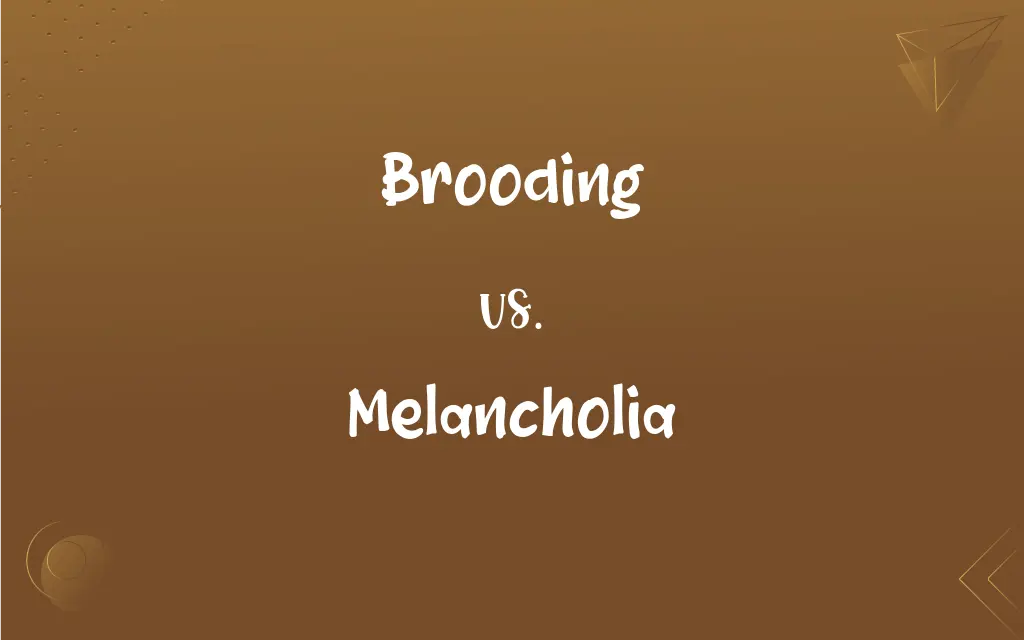Brooding vs. Melancholia: What's the Difference?
By Harlon Moss || Updated on May 20, 2024
Brooding refers to deep, often troubled or moody thinking, while melancholia is a profound, pervasive sadness or depression, often with no clear cause.

Key Differences
Brooding involves persistent and often intense contemplation, typically about problems or worries. It is characterized by a moody or troubled state of mind, where an individual is preoccupied with distressing thoughts. Melancholia, on the other hand, is a severe form of depression marked by an overwhelming sense of sadness and despair. Unlike brooding, melancholia may not be linked to specific thoughts or worries but instead manifests as a general, pervasive emotional state.
Brooding often involves a focus on specific issues or events, leading to a cycle of negative thinking that can be hard to break. This ruminative process can exacerbate feelings of anxiety and stress. Melancholia, in contrast, is more diffuse and can affect a person's overall outlook on life, leading to a loss of interest in activities and a feeling of emptiness.
In literature and art, brooding characters are often depicted as introspective and intense, grappling with inner conflicts. Melancholia is portrayed as a deep, almost existential sorrow, often without a clear cause. While brooding can sometimes be resolved through problem-solving or changing one's mindset, melancholia often requires professional intervention, such as therapy or medication, due to its intensity and persistence.
Brooding can be a temporary state, often triggered by specific circumstances or stressors. Once the underlying issues are addressed, the brooding may subside. Melancholia, however, is more enduring and can persist over long periods, significantly impacting one's quality of life and daily functioning.
Comparison Chart
Definition
Deep, troubled, or moody thinking
Profound, pervasive sadness or depression
ADVERTISEMENT
Focus
Specific issues or worries
General, diffuse emotional state
Characteristics
Introspective, ruminative
Overwhelming sadness, loss of interest
Duration
Temporary, situation-based
Long-lasting, persistent
Resolution
Can be resolved through mindset change
Often requires professional intervention
Brooding and Melancholia Definitions
Brooding
Deep, moody contemplation.
He sat by the window, brooding over his past mistakes.
ADVERTISEMENT
Melancholia
A deep sense of sadness without clear cause.
His melancholia made even joyful occasions seem dull.
Brooding
Engaging in persistent worry or rumination.
She spent the afternoon brooding about her upcoming exam.
Melancholia
A condition marked by a lack of interest in life.
Melancholia left him disinterested in his hobbies.
Brooding
Often associated with negative emotions.
His brooding nature made him seem distant and unapproachable.
Melancholia
Severe, pervasive depression.
She was diagnosed with melancholia after months of persistent sadness.
Brooding
Characterized by a troubled state of mind.
The brooding artist painted dark, intense scenes.
Melancholia
Overwhelming feelings of despair.
The novel captured the essence of melancholia through its somber tone.
Brooding
The young of certain animals, especially a group of young birds hatched at one time and cared for together.
Melancholia
Extreme, persistent sadness or hopelessness; depression. No longer in clinical use.
Brooding
The children in one family.
Melancholia
Deep sadness or gloom; melancholy
Brooding
To focus the attention on a subject persistently and moodily; worry
Brooded about his future.
Brooded over the insult for several days.
Melancholia
(pathology) depression, characterised by irrational fears, guilt and apathy
Brooding
To be depressed
All he seemed to do was sit and brood.
Melancholia
A kind of mental unsoundness characterized by extreme depression of spirits, ill-grounded fears, delusions, and brooding over one particular subject or train of ideas.
Brooding
To sit on or hatch eggs.
Melancholia
Extreme depression characterized by tearful sadness and irrational fears
Brooding
To protect developing eggs or young.
Melancholia
Often requiring medical or therapeutic intervention.
Treatment for melancholia typically includes therapy and medication.
Brooding
To hover envelopingly; hang
Mist brooded over the moor.
Brooding
To think about (something) persistently or moodily
Brooded that her work might come to nothing.
Brooding
To sit on or hatch (eggs).
Brooding
To protect (developing eggs or young).
Brooding
Kept for breeding
A brood hen.
Brooding
(of a bird) Broody; incubating eggs by sitting on them.
A brooding hen can be aggressive.
Brooding
Deeply or seriously thoughtful.
Brooding
Present participle of brood
Brooding
A spell of brooding; the time when someone broods.
Brooding
Worried and thinking long and intensely, especially about a particular problem.
Brooding
Good at incubating eggs, especially of a fowl kept for that purpose; as, a brooding hen.
Brooding
The process of sitting on eggs so as to hatch them by the warmth of the body; - mostly used of birds.
Brooding
Sitting on eggs so as to hatch them by the warmth of the body
Brooding
Persistent morbid meditation on a problem
Brooding
Persistently or morbidly thoughtful
Brooding
Reflective and introspective thinking.
Brooding on his decisions, he realized the need for change.
FAQs
Can brooding lead to melancholia?
Yes, persistent brooding can contribute to developing melancholia or depression.
How does brooding differ from melancholia?
Brooding involves ruminating on specific problems, while melancholia is a general state of deep sadness.
Is brooding always negative?
While often associated with negative thoughts, brooding can sometimes lead to personal insights and solutions.
How is melancholia treated?
Melancholia typically requires professional intervention, such as therapy or medication.
Can brooding be a part of normal thought processes?
Yes, occasional brooding is normal, especially when dealing with stress or difficult decisions.
What is melancholia?
Melancholia is a profound, pervasive sadness or depression, often with no clear cause.
What is brooding?
Brooding is deep, often troubled or moody thinking focused on specific issues or worries.
Can brooding be temporary?
Yes, brooding is often a temporary state triggered by specific circumstances.
Does brooding always require treatment?
Not always, but if brooding leads to persistent negative emotions or impacts daily functioning, seeking help is advisable.
What is the difference between melancholia and sadness?
Melancholia is a severe, enduring form of depression, while sadness is a temporary emotional response.
Can brooding be a sign of a larger mental health issue?
Persistent brooding can be a symptom of underlying mental health issues like anxiety or depression.
Is melancholia the same as clinical depression?
Melancholia is a specific, severe subtype of clinical depression.
What should you do if you suspect someone has melancholia?
Encourage them to seek professional help from a therapist or doctor.
What are common symptoms of melancholia?
Common symptoms include profound sadness, loss of interest in activities, and a feeling of emptiness.
How long does melancholia typically last?
Melancholia can persist for weeks, months, or even longer without treatment.
Is brooding common among creative individuals?
Yes, many creative individuals are known to brood, which can fuel their work.
Is melancholia considered a mental illness?
Yes, melancholia is a severe form of depression and is considered a mental health condition.
Can lifestyle changes help with brooding?
Yes, lifestyle changes, mindfulness, and stress management can help reduce brooding.
Are there any benefits to brooding?
Sometimes, brooding can lead to deeper self-reflection and problem-solving.
What are common triggers for melancholia?
Triggers can include genetic factors, major life changes, trauma, or sometimes no apparent cause.
About Author
Written by
Harlon MossHarlon is a seasoned quality moderator and accomplished content writer for Difference Wiki. An alumnus of the prestigious University of California, he earned his degree in Computer Science. Leveraging his academic background, Harlon brings a meticulous and informed perspective to his work, ensuring content accuracy and excellence.































































